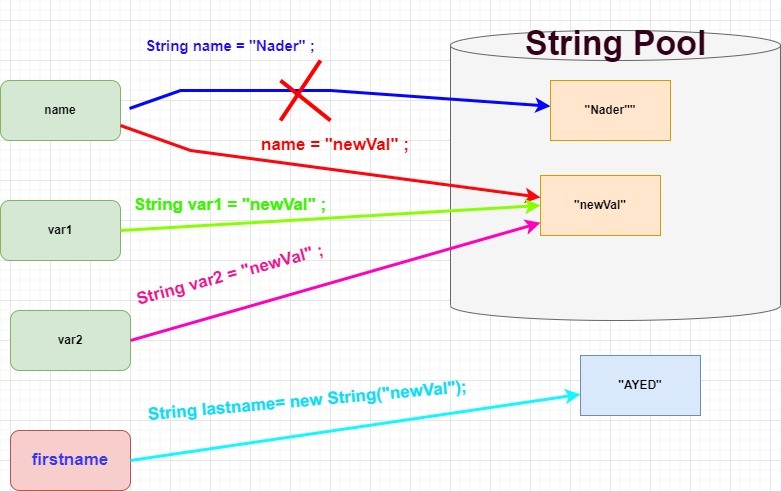Why Are Strings Immutable in Java? Protection and Performance Benefits
Why Are Strings Immutable in Java? Protection and Performance Benefits
Blog Article
What Is Unalterable Strings and How It Functions
In the realm of shows, recognizing the principle of unalterable strings is vital for producing protected and robust applications. Unalterable strings refer to strings that can not be modified after they are produced, making sure data integrity and predictability within the code.
The Essentials of Immutable Strings
Immutable strings, as a basic principle in shows, are personality sequences that can not be altered once they are created. This suggests that once a string is designated a value, that value can not be altered. In languages like Python and Java, strings are unalterable things, bring about various effects in regards to memory monitoring and data stability.
One of the vital advantages of immutable strings is that they supply a sense of safety and security in information adjustment. Since the material of an unalterable string can not be customized, it makes sure that the initial information continues to be undamaged, decreasing the threat of unintentional modifications during program implementation (Why are strings immutable in Java?). This home also simplifies debugging processes, as programmers can trust that as soon as a string is specified, its worth will certainly not be accidentally changed
Moreover, immutable strings facilitate reliable memory use. When a new string is developed based on an existing one, instead of modifying the original string, the brand-new value is saved independently. This approach enhances efficiency by lowering memory fragmentation and simplifying memory allowance procedures. On the whole, understanding the basics of unalterable strings is essential for mastering programs principles and enhancing code performance.
Advantages of Immutable Strings
Building upon the safety and security and performance benefits of unalterable strings, their advantages encompass enhancing code integrity and streamlining concurrent programming jobs. By being immutable, strings can not be changed after production, which gets rid of the threat of unintended modifications in the data they store. This inherent immutability makes certain that once a string is produced, its value remains continuous throughout the program's execution, reducing the chances of pests caused by unanticipated modifications.
Furthermore, immutable strings add to code integrity by making it less complicated to reason regarding the state of a program. Since strings can not be transformed, developers can rely on that a string will certainly constantly hold the exact same value, simplifying debugging and maintenance efforts. This predictability results in extra reliable and secure codebases.

Execution in Programming Languages
Within different programming languages, the consolidation of immutable strings is a basic aspect that influences just how data is managed and adjusted within code frameworks. The application of unalterable strings varies across different programming languages, with each language offering its own mechanisms to sustain this idea.

In comparison, languages like C and C++ do not have integrated assistance for immutable strings. Designers in these languages need to manually execute immutability by enforcing rules within their code to prevent direct modifications to string objects.
Best Practices for Working With Immutable Strings
When dealing with unalterable strings in shows languages like Java and Python, adhering to best practices makes certain reliable and safe data manipulation. One of the key finest practices is to use StringBuilder or StringBuffer as opposed to directly manipulating strings, especially when dealing with substantial concatenation operations. These courses provide mutable alternatives for string manipulation, aiding to avoid unnecessary memory appropriations and enhancing efficiency.
Another ideal method is to use string interpolation or formatting works supplied by the language instead of manual concatenation. This not only enhances readability yet also help in avoiding typical mistakes such as unintentional string alterations. Additionally, when dealing with delicate data such as passwords or API tricks, it is essential to prevent storing them as ordinary message in unalterable strings. Using secure storage mechanisms like char varieties or specialized libraries for taking care of sensitive info assists reduce safety threats connected with unalterable strings.
Real-world Applications and Instances
Checking out useful implementations of immutable strings in various industries exposes their considerable effect on data integrity and system integrity. In the healthcare market, unalterable strings play a crucial role in ensuring the protection and privacy of individual data. By protecting against unauthorized alterations to sensitive details such as clinical records and prescriptions, unalterable strings help preserve conformity with stringent personal privacy policies like HIPAA.
Financial institutions also take advantage of the immutable nature of strings to boost the safety and security of customer data and purchase records. Immutable strings assist avoid fraud and look at here unapproved modifications to monetary details, supplying a robust protection versus cyber risks and ensuring the depend on and self-confidence of clients.

Final Thought
Ideal methods for working with unalterable strings consist of avoiding straight alterations and utilizing approaches that return brand-new string objects. Real-world applications of immutable strings include data encryption, caching, and string control jobs.
Unalterable strings refer to strings that can not be altered after they are developed, making sure data integrity and predictability within the code. When a new string is created based on an existing one, rather than customizing the initial string, the brand-new value is kept individually.In languages like Java and Python, strings are immutable by default, implying that once a string item is developed, its worth can not be transformed - Why are strings immutable in Java?. Ideal techniques for working with my link immutable strings include staying clear of straight alterations and using approaches that return brand-new string items. Real-world applications of immutable strings include data security, caching, and string adjustment tasks
Report this page